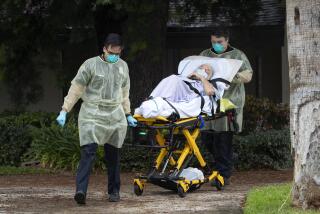Nursing Is What Needs the Cure
How many sick patients can one nurse handle? Five? Ten? Does it make a difference if you--or your child--is one of the 10? Does it matter if the nurse is on her second eight-hour shift?
Over the past year, news reports around the country have confirmed the existence of a serious nursing shortage. In the U.S., the average age of working nurses, now 47, is rising, while enrollments in four-year nursing schools have declined for the sixth consecutive year. Polls and studies show why nurses are leaving their chosen profession: They are fed up with mounting workloads, mandatory overtime and pay levels. Elected officials are finally beginning to act. Unfortunately, what their proposals will do little to remedy the underlying causes of the nursing shortage.
Two Senate bills, the Nurse Reinvestment Act by John F. Kerry (D-Mass.) and James M. Jeffords (I-Vt.) and the Nursing Employment and Education Development Act by Tim Hutchinson (R-Ark.) and Barbara A. Mikulski (D-Md.), differ in their details, but both define the nursing shortage as a problem that can be solved through education and public relations. The Nurse Reinvestment Act, for example, would provide scholarships to students who agree to work for two years in understaffed public or nonprofit health care facilities and would allocate federal dollars to recruitment and ad campaigns to enhance the public image of nursing.
While this is important, improving working conditions is crucial. Veteran nurses and even recent nursing school graduates are discouraging others from entering the field and even advising nursing students to get out of bedside care as soon as they can. Without substantive changes in working conditions, luring more people into the profession will aggravate, not alleviate, the situation and encourage the âmanagement by churnâ that has reduced customer service quality in fast food, retail sales and telemarketing, where the consequences are far less serious for consumers than in health care.
We need legislative initiatives to make nursing a stable, rewarding, long-term career. The place to start is with bans on mandatory overtime and steps in favor of safe staffing ratios. Sen. Edward M. Kennedy (D-Mass.) and Sen. Kerry have introduced legislation that would ban mandatory overtime for RNs. On the state level, California has led the way with a safe staffing law. Now the battle is over what nurse-to-patient ratio is âsafe.â
The California Hospital Assn. thinks itâs safe for each nurse on a busy medical surgical floor to care for 10 patients, while California Nurses Assn. says the safe number is three and the Service Employees International Union says four. If youâd just had an operation, would you rather be cared for by a nurse who has to deal with nine other patients or a nurse who has to deal with just two or three others?
The positive impact of changes in salaries and working conditions has been proved. After intense lobbying by the Australian Nurses Federation, the state of Victoria recently adopted union-backed nurse-to-patient ratios of one nurse to four patients on busy medical surgical units and one to seven for nursing homes. In addition, Victoria mandated a 12.5% pay increase over three years, paid study leave and financial rewards based on education. Since these improvements in the past year, 2,300 nurses who had dropped out of the work force have returned. The federation also reports higher morale and reduced turnover and sick-day utilization at major hospitals.
In the U.S., a recent poll reported that a majority of the nurses surveyed would remain at or return to the bedside if working conditions and salaries were improved. In my own interviews with nurses, many also say they would gladly encourage new candidates if they felt nurses were allowed to provide high-quality care.
Policymakers should listen to these nurses. The rule should be that neither hospitals nor their industry association get any money for training, education or recruitment unless that money is tied to changes in the behavior that created the nursing shortage and that continues to threaten vulnerable patients every day.






